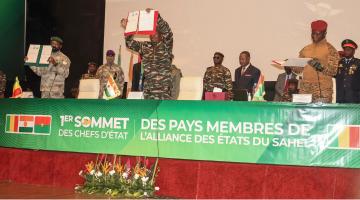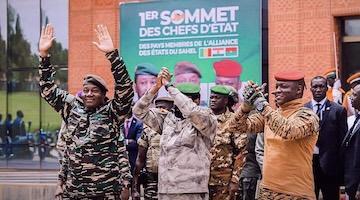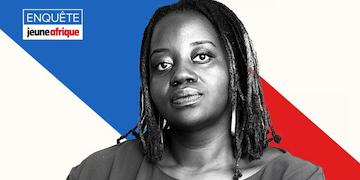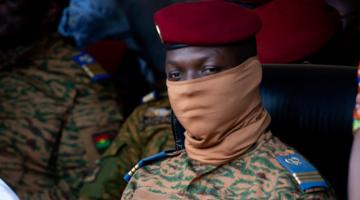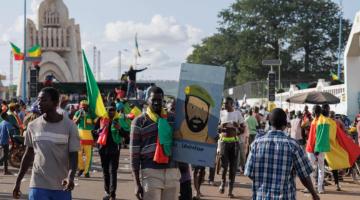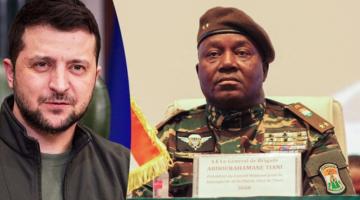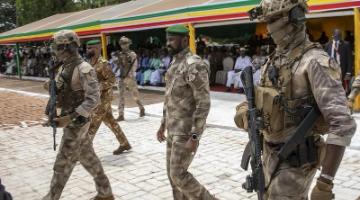The "scramble for Africa" continues with the U.S., former colonizers such as France, and now Russia, all competing for influence. African nations struggle for true sovereignty.
During the 1930s and 1940s, movies that featured the character Tarzan told far-fetched tales about an extraordinary white man who moved more easily through the African bush than the wildlife indigenous to the Congo region. In fact, elephants, lions, apes, and all other living creatures were loyal subjects of this white man, and they catered to his every whim. He needed only to let fly a blood curdling yodel that echoed for miles through the treetops, hills and valleys, and animals came running from near and far to do his bidding.
The circumstances, situations and predicaments in these movies that provided the medium for dramatic tension, conflict and romance were created by the intrusion of other white people into Tarzan’s African sanctuary. Somehow, both a white woman and a white boy child found their way to “the escarpment,” Tarzan’s home, and they became his family. Other khaki-clad, pith helmet-wearing white people, some good, some evil, dropped in from time to time to harvest ivory or capture animals for circuses or to conduct scientific research. In one movie, Tarzan even had to tangle with a band of Nazis.
In all these movies, Africans themselves remained, at best, a part of the landscape. Their drums were heard in the background. When they emerged from the underbrush, they were fierce, hideous, savage creatures, wilder than the most ferocious animals, and clearly much, much dumber. There were of course a few good ones who functioned as guides, servants and overseers for the white people who counted. But otherwise, Africans had no important role to play in any aspect of anything important.
The Tarzan concept might seem bizarre at first blush, but not much imagination was required to create it. When it comes to Africa, the continent’s people have always been regarded by colonizers as an insignificant part of the landscape. Imperialists believe that at most, Africans must be managed by non-Africans, but certainly they can play no significant roles in the plots and the schemes of those whose gaze is fixed firmly, not on Africa’s people, but on the continent’s mineral wealth, oil, and other natural resources.
The invisibility of Africans has long, deep roots in the depersonalization of those who became merchandise traded in an international enterprise that lasted for centuries. Even after slavery’s demise, the fiction of the non-existence of African people manifested in the earliest colonial projects. During the so-called “scramble for Africa,” the battles that mattered most to Europe were turf skirmishes in Africa fought against other Europeans. These conflicts were resolved in the latter part of 1884 and the early part of 1885 when representatives of European states interested in colonizing Africa met in Berlin and divided the continent among themselves without bothering to consult even in passing with Africans.
Although we are now well into the 21st Century, Africans remain in the European mind nothing more than part of the scenery. Colonialism is now a dirty word, and no decent country will candidly own up to it, but substantial resources of western governments are dedicated to preserving for their corporations, access to Africa’s natural resources, even if it means devastating consequences for invisible Africans.
More than most, France has been committed to preserving domination of its former colonial empire. When there are perceptions that so-called terrorist groups threaten the stability of corporate operations, military forces have been deployed to kick butt, whether Africans in those territories like it or not.
However, in recent months, even France has grown weary of the burdens, challenges, and costs of a military approach. French soldiers are being withdrawn in large numbers and at a fast pace. This has generated tremendous concern around the globe, especially in Mali. There is much violence and great political instability there, and the machinery of government is in the hands of a military junta. But in the minds of Mali’s people, a French military presence is not the answer.
Boubacar Salif Traore, a Malian consultant told Al-Jazeera: “Many Malians believe that the Western presence has no other purpose than the exploitation of raw materials. The French policy is decried in Mali because it is considered neocolonialist by many observers and advisers to the authorities in place.”
The Al-Jazeera report further explains: “Despite the presence of thousands of United Nations and French forces, the violence has worsened and spread beyond Mali’s borders as armed groups linked to al-Qaeda and the ISIL (ISIS) group have exploited age-old tensions among various ethnic communities and tapped into deep-seated local grievances.”
As in much of Africa, the “local grievances” and roots of Mali’s instability are in extensive poverty, with more than 5.9 million people in need of urgent humanitarian assistance, and with more than 380,000 having been internally displaced. But also, as in much of Africa, the people themselves are invisible and not part of the calculation, and the players try everything other than satisfying the most basic needs of the people to resolve the problems. In Mali’s case, the ruling junta faced with the loss of French military force to contain armed groups, is negotiating a contract with the Wagner Group, a Russian company that is poised to place 1,000 mercenaries under the command of Mali’s regime.
The prospect of a Russian company with close ties to the Russian government playing a prominent role in Mali has generated extreme panic among western imperialist powers. In 1885 the conference in Berlin was all about sharing opportunities to exploit Africa, but the idea of Russia feeding at the imperialist trough in Mali is not welcome news.
Steve Balestrieri, a military analyst and journalist explained: “Russia hopes to gain two things from its involvement in Mali. Firstly, it is trying to extend its influence in Africa. If the proposed deal with Wagner fructifies, Moscow will move a lot closer to that goal, while the West’s influence will be diminished. Secondly, Russia is after gold. Mali is Africa’s third-largest gold producer, but its industry has suffered from jihadist attacks. It is probable that the deal will include some kind of gold mining concessions to Moscow, even though it claims to have no involvement in the negotiations between the Malian government and Wagner.”
Imperialists are not the only ones worried about potential Russian engagement. The people of Mali are also concerned, but for different reasons. BBC News reported: “Oumar Cissé, a prominent peace campaigner in the restive Mopti region, said Russia was a historical partner of the Malian army. ‘Russia has no interest in Malian politics unlike France, which manages the conflict according to its economic and political interests…’”
The BBC report continues: “Some activists say the presence of the French forces itself was a catalyst of the jihadist violence. France has long opposed negotiations with jihadists, an option favored by some Malians. There have been no public protests against Russia but public opinion towards the proposed intervention from Wagner is divided. The Coordination of the Movements of the Azawad (CMA), a coalition of former Arab and Tuareg rebels in northern Mali, said working with the Russians would be a threat to their 2015 peace deal.”
It has always been true that neither France, Russia, the U.S. nor any colonizing force for that matter will take it upon themselves to truly solve the problems that confront Africa’s people. Africans must and will save themselves by driving all long-time and Johnny-come-lately imperialists out of Africa and harnessing the continent’s wealth for the benefit of Africa’s people. That revolutionary process begins with a frank acknowledgment of not only the poverty that plagues Africa, but also the fact that imperialist intruders have historically and routinely ignored the material needs of Africa’s people and caused desperate conditions in the first place.
Mark P. Fancher is an attorney and the author of the newly published novel: The Negroes of Friends Village. Fancher is a member of the Black Alliance for Peace Africa Team and the All-African People’s Revolutionary Party. The views expressed are his own and do not necessarily reflect the views of organizations with which he is affiliated. He can be contacted at mfancher[at]comcast.net.


